|
|
|
Sort Order |
|
|
|
Items / Page
|
|
|
|
|
|
|
| Srl | Item |
| 1 |
ID:
087033
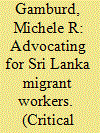

|
|
|
|
|
| Publication |
2009.
|
| Summary/Abstract |
Nearly a million Sri Lankan women labor overseas as migrant workers, the vast majority in the Gulf Cooperation Council (GCC) countries in West Asia. They are poorly paid and vulnerable to a wide variety of exploitative labor practices at home and abroad. Despite the importance of worker remittances to Sri Lanka's national economy, and in spite of the nation's history of organized labor and active political participation, migrants have received only anemic support from the state, labor unions, feminist organizations, and migrant-oriented nongovernmental organizations. The article contextualizes Sri Lankan migration within larger-scale economic dynamics (such as global capitalist policies and processes) and local-level ideological formations (such as local political histories and culturally shaped gender norms). The author argues that political freedoms in destination countries have a significant effect on organizing activities in both host and sending nations. Comparing the Sri Lankan and Philippine situations, the author contends that the vibrant activism in the Philippines correlates with the liberal organizing climates in the European Union and in East and Southeast Asia, while the paucity of organizing in Sri Lanka correlates with the strict repression of guest workers in the GCC. Compared to other destinations, the GCC countries give workers (particularly women) less chance for autonomous activities, are less open to labor organizing, and are less responsive to political protest.
|
|
|
|
|
|
|
|
|
|
|
|
|
|
|
|
| 2 |
ID:
155045
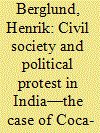

|
|
|
|
|
| Summary/Abstract |
The Indian economic and political systems have recently opened up for increased foreign investments, which has resulted also in new forms of popular resistance. This article analyzes the campaign launched against the Coca-Cola-Company in Plachimada, Kerala, India, which in 2004 resulted in the closure of its bottling factory after accusations of water depletion and pollution. The analysis in the article is based on the theoretical concept “political opportunity” and concludes that the decision to close the plant was the result of an efficiently run popular campaign based on a tightly knit group of local activists, held together by a tribal identity. Vital for the success was also the help the group attracted by national and international civil society support groups and media, as well as the link between both media and civil society towards the political parties and the state.
|
|
|
|
|
|
|
|
|
|
|
|
|
|
|
|
| 3 |
ID:
131858
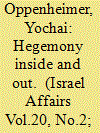

|
|
|
|
|
| Publication |
2014.
|
| Summary/Abstract |
This article examines the political protest expressed by Nathan Alterman over the years in poems published in the newspapers. It argues that this criticism identifies with the hegemonic political values rather than articulate alternative ones, in an attempt to nurture self-criticism on the part of the government regarding its failures and mistakes. This type of criticism seeks to preserve the reigning hegemony from within and to ensure that it projects an image of moral rectitude.
|
|
|
|
|
|
|
|
|
|
|
|
|
|
|
|
| 4 |
ID:
127345
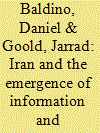

|
|
|
|
|
| Publication |
2014.
|
| Summary/Abstract |
This study examines the emergence of information and communications technology (ICT) in facilitating political protest in the Middle East, with a focus on the Iranian experience. With the rise of 'emancipating technology' to mobilise popular support, many had hoped that the incumbent regime in Iran would be steered towards a more democratic and less authoritarian path. At the same time, the Iranian regime itself has shown an increasingly sophisticated technical nous, constructing a centralised censorship network and using available technology to proliferate propaganda and control and subdue cyber-protest. As such, ICT has acted as a complex dual-edged sword in both mutually supporting and suppressing political activism in modern-day Iran.
|
|
|
|
|
|
|
|
|
|
|
|
|
|
|
|
| 5 |
ID:
155175
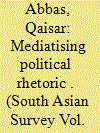

|
|
|
|
|
| Summary/Abstract |
The mediatisation of politics has been a dominant theory in the field of political
communication for some time, proposing that the mass media in democratic
societies tend to dominate the political process. This research intends to explore
the media-politics nexus as part of the protest campaign in 2014 in Pakistan,
also known as the long march. Specifically, it analyses dynamics of the political
rhetoric of protesting leaders and dimensions of the two selected TV talk shows.
Using textual analysis as research methodology, this article concludes that by
transforming the political theatre into a media theatre, the talk shows effectively
mediatised the long march. TV news became part of the political process, rather
than covering it objectively, either by supporting or opposing the long march.
The two top political leaders of the long march voluntarily adopted media logic
as a rhetorical strategy to offer a readymade product for media coverage.
|
|
|
|
|
|
|
|
|
|
|
|
|
|
|
|
| 6 |
ID:
132217
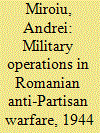

|
|
|
|
|
| Publication |
2014.
|
| Summary/Abstract |
Romanian anti-communist armed resistance has received relatively little attention outside the country, despite its resemblance to other small, diffused, headless insurgencies being fought in the first decades of the twenty-first century. This article deals with military operations mounted against the partisans, with a special focus on tactics such as cordoning, checkpoints, patrols, sweeps, ambushes, and informed strikes. Based mostly on primary sources, it highlights success and failure against determined and elusive guerrillas.
|
|
|
|
|
|
|
|
|
|
|
|
|
|
|
|
| 7 |
ID:
124525
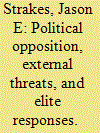

|
|
|
|
|
| Publication |
2013.
|
| Summary/Abstract |
In the years since the 2003 Rose Revolution, the popularly elected leadership of the Republic of Georgia has responded to organized protests with a variety of repressive tactics. These reactions suggest that former challengers to authoritarian elites may utilize similar methods of retaining power during crisis periods. Yet, the alleged involvement of agencies of the Russian Federation in fomenting domestic instability has also occupied a central position in the national security policies of the outgoing Saakashvili government. These conditions both preceded and were reinforced by the South Ossetia War of August 2008. This article proposes a theoretical model that represents the intervening effect of interstate conflicts on state-society relations in Georgia from 2003 to present. It presents several hypotheses and possible indicators, data sources, and techniques for analyzing the interaction between characteristics of opposition groups, external threats, and the domestic security practices of contemporary Georgian political elites.
|
|
|
|
|
|
|
|
|
|
|
|
|
|
|
|
| 8 |
ID:
148945
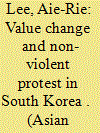

|
|
|
|
|
| Summary/Abstract |
Using the first, second, and sixth waves of the World Values Surveys, this article examines the extent to which the mass public's values have changed and/or persisted and their impact on political orientations, measured by protest potential and leftist ideology, in Korea. We find that the emergence of an authoritarian-libertarian value cleavage has played an important, if not vital, role in shifting mass political attitudes and in enhancing the propensity to engage in political action from the authoritarian rule, to the democratic transition, and to the period of democratic consolidation. We also empirically uncover our authoritarian-libertarian value scale is related to increasing levels of leftist reform-oriented attitudes, whereas age has become less important to Koreans in defining their orientations to political protest, especially during the period of democratic consolidation.
|
|
|
|
|
|
|
|
|
|
|
|
|
|
|
|
| 9 |
ID:
132078
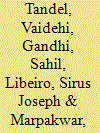

|
|
|
|
|
| Publication |
2014.
|
| Summary/Abstract |
In developing countries, separation of powers coexists with corruption by the ruling elite. This can be attributed to informal institutions, which counter the formal checks and balances. We demonstrate, by studying the Adarsh scam, the vulnerabilities of checks and balances. Fourteen actors belonging to different tiers of the Indian federal setup who could have vetoed the project or certain permissions failed to do so.We find that 54 percent of the checks collapsed because of quid pro quo, 21 percent due to being overridden, 4 percent due to misrepresentation, 7 percent due to absorption, and 14 percent due to omissions in the process.
|
|
|
|
|
|
|
|
|
|
|
|
|
|
|
|
|
|
|
|
|